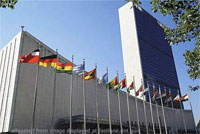Interfax: Russian peacekeepers can’t be sent to eastern Ukraine without UN approval – Russian senator

MOSCOW. April 7 (Interfax) – Russian peacekeepers can be sent to a foreign country exclusively within the framework of international law, not at the request of local authorities, Chairman of the Federation Council’s Defense and Security Committee Viktor Ozerov told Interfax while commenting on the Donetsk People’s Council’s possible appeal to Russia to send peacekeepers to this part of Ukraine.
“Our peacekeepers can only act in compliance with international law. We had examples when peacekeepers were sent to South Ossetia and Abkhazia, but that was done within the framework of the Commonwealth of Independent States. Just sending our peacekeepers to Donetsk, or elsewhere at the request of the local authorities would go against the principles of international law,” Ozerov said.
“Russia has no right to do this unilaterally. If, however, the UN Security Council passes a resolution on the introduction of peacekeepers, Russia, as its permanent member and a signatory to the Treaty on Cooperation and Security in Europe, will have the right to join a peacekeeping contingent in order to guarantee security in this or that region,” Ozerov said.
He said the Federation Council allowed the president to use the military in Ukraine at an emergency meeting in March. “That was connected with the situation in Crimea. However, in this case we were motivated by the Black Sea fleet agreements and the need to enhance the security of our bases. We are satisfied that we did not have to use Russian servicemen during the referendum in Crimea, and that residents of Crimea decided their future on their own,” Ozerov said.
Commenting on the situation in Ukraine’s eastern regions, where pro-Russian forces want to hold a referendum, Ozerov said that, “it would be counterproductive to incite events from the outside.”
“Russia is interested in stability in Ukraine. At the same time, the will of the people must be documented. A referendum is the most democratic way of expressing one’s will,” Ozerov said.
Chairman of the Federation Council’s Social Policy Committee Valery Ryazansky shares this opinion. “What is happening in Donetsk, Luhansk and other eastern regions of Ukraine is logical, taking into account the policy being pursued by the Ukrainian leaders, who disregard ordinary citizens’ opinions and appoint oligarchs to govern,” Ryazansky told Interfax.
Residents of Donetsk, Luhansk and other regions are talking about the need to strengthen the role of their own municipal entities, and about the role of the constituent regions in running the country. “Residents of these regions advocate bilingualism and recognition of the state status of the Russian language. In a word, they are talking about the most essential things, nothing else. However the authorities disregard the interests of the people. As a consequence, events unfold with calls for holding a referendum,” Ryazansky said.
People filled the streets and staged protests for the only reason that the authorities do not want to talk with them and do not want to hear them.
About 150 protestors broke into the regional administration headquarters in Donetsk and demanded that the regional legislature gather for an unscheduled session and call a referendum on the region’s membership in Russia. The Ukrainian security service’s Donetsk regional department was seized on April 7.
The regional legislature convened in the regional administration building on Monday and approved a declaration of the Donetsk People’s Republic’s sovereignty. It also announced plans to hold a referendum on the formation of the Donetsk Republic no later than May 11.
